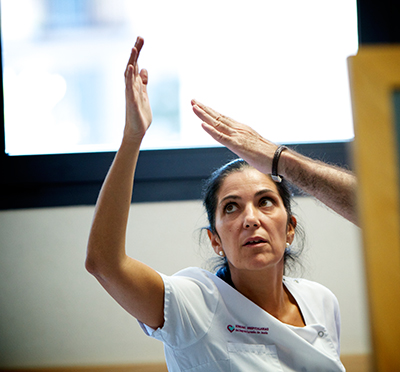At the Menni Brain Damage Network, we intend to optimise the wellbeing of patients.
Our treatment programmes are aimed at increasing the level of participation and social integration of service users. To this end, we work on the physical, mental, educational and occupational areas while providing information and guidance to the patient’s family.
Physical rehabilitation

Brain injury may affect physical mobility; some patients cannot walk, stand up, or remain seated. Our physiotherapists deal with mobility issues by developing personalised programmes to improve joint balance, upright standing, bipedalism, balance, and walking.
Neuropsychological rehabilitation
Neuropsychology studies the psychological processes interacting in social functioning and behaviour. Cognitive, emotional, and behavioural problems are common in brain-injured people. Our neuropsychological rehabilitation programmes aim to reduce the impact of such impairments. Programmes can focus on attention, memory management, executive functions, self-awareness, or social skills, to name but a few areas.
Occupational therapy
Occupational therapists in our services work to attain goals that are closely linked to independence in activities of daily living, ranging from simple activities such as bathing, getting dressed, or eating to more complex ones like travelling on public transport, using a computer, or performing job-related tasks.
Evaluating home adaptations for brain-injured people and choosing special tools (cutlery, computer mouse) are tasks also carried out by occupational therapists. Finally, they help patients find ways to improve hand strength and skill, if affected by brain injury.
Psychotherapy
The psychological state of the person affected by brain damage and their family plays a key role in the patient’s rehabilitation process. This is why our programmes address this issue, including psychotherapy when patients need it.
Speech-language therapy
Speech-language therapists work with patients who are suffering from speech deficits (dysarthria, dyspraxia, dysprosody), language impairment (global language deficit, inability to speak, aphasia, alexia, agraphia), and voice dysfunctions (dysphonia). When necessary, they use alternative communication systems.

